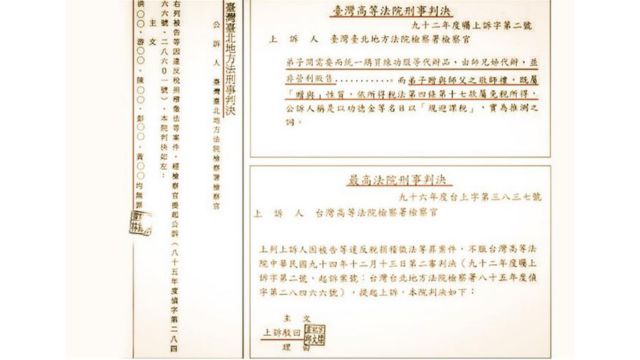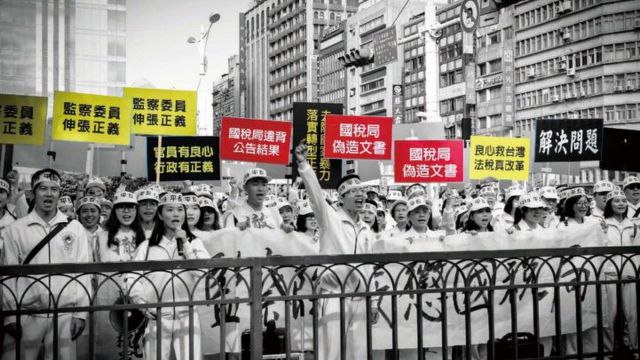While we celebrate the anniversary of the Supreme Court decision of 2007, we should also ask why it failed to achieve its full effects.
by María Vardé*
*A paper presented at the webinar “13 July 2007: Who Stole Tai Ji Men’s Victory?” organized by CESNUR and Human Rights Without Frontiers on July 13, 2024, on the 17th anniversary of Tai Ji Men’s Supreme Court victory.
An article already published in Bitter Winter on July 17th, 2024.

Today, we celebrate the 17th anniversary of Tai Ji Men’s Supreme Court victory. While it is a celebration, it also serves as a reminder of an incomplete justice.
The Tai Ji Men case began in 1996 with a politically motivated crackdown on religious and spiritual groups in Taiwan. Taiwanese tax laws state that tuition fees for cram schools are taxed, while gifts and donations from disciples to masters of qigong, martial arts, and self-cultivation are not. Misusing these laws, prosecutor Hou Kuan-Jen, the man who started the case, falsely accused Tai Ji Men of being a cram school to prosecute its leader Dr. Hong Tao-Tze, Dr. Hong’s wife, and two dizi for tax evasion as well as for fraud.
After years of struggling against state violence and Prosecutor Hou’s ridiculous accusations, including of “raising goblins,” the first criminal decision on September 25, 2003, acquitted all defendants, including Dr. Hong, marking the first major legal victory for Tai Ji Men. The second not-guilty verdict in the appeal criminal trial further confirmed Tai Ji Men’s innocence on December 13, 2005.
On July 13, 2007, a final criminal trial at the Supreme Court acquitted the defendants again and concluded that there was no tax evasion, nor any other crime committed by Dr. Hong and the other defendants. This should have been the end of the Tai Ji Men case.

However, the fight did not end. The National Taxation Bureau continued to consider Tai Ji Men as a cram school, imposing unjust taxes and penalties without any legal basis. Continuing with the legal battles, in 2018, the Supreme Administrative Court ruled against the National Taxation Bureau, confirming that Tai Ji Men is an academy of qigong, martial arts, and self-cultivation, and is not a cram school, which eventually led to the correction of tax bills for all years except 1992 to zero.
Despite all court decisions in favor of Tai Ji Men, the National Taxation Bureau maintained the tax bill for the fiscal year 1992, based on the technical argument that for that year a court decision against Tai Ji Men had become final and was no longer appealable. This resulted in the seizure, unsuccessful auction, and nationalization of land intended for a self-cultivation and educational center in 2020, an event that was heartbreaking for all Tai Ji Men dizi (disciples) and their friends worldwide.
We know that every legal dispute involves different actors and positions, each with one or more versions of the truth. Throughout the dispute resolution processes, the involved parties are expected to approach, discuss, and negotiate the different versions to reach an agreement. Ultimately, an arbitrator analyzes the different versions and defines which one has sufficient support to be considered true. In democratic Western societies, this is (or should be) the role of the courts.
In the Tai Ji Men case, Dr. Hong and his dizi have confronted slander and false accusations by defending themselves at every step of the conflict in court. They have invested much time and energy in making themselves heard. They have been supported by other sectors of society, academics, non-governmental organizations, and politicians. They have achieved one victory after another, even in the highest courts of justice, because their version of the facts has proven truthful every time.

So why are we here today? Clearly, the answer can no longer be sought in the legal proceedings, as they have all shown Tai Ji Men were right. Nor can that answer be sought in public scrutiny, which also accepts and celebrates Tai Ji Men as an academy of qigong, martial arts, and self-cultivation, with its countless contributions to peace and justice in numerous cultural and social activities. There is no doubt about it.
To understand why the harassment of Tai Ji Men did not end with the legal victories it is necessary to recall that no legal process is alien to the power structures of society, much less to the internal relations of the political fields of the government. This necessarily means that power inequalities can (and often do) affect the proper functioning of justice. The answer, then, must be found in an imbalance in the internal powers of the State.
Taiwan is a democratic republic whose government is organized under a system of five branches—in addition to the Legislative, Executive, Examination, and Judicial Yuan there is a Control Yuan that should make sure that the other branches respect the laws—, each independent from the other and acting under its public duty protocols. The spirit of this system is to maintain sufficient order and control over each branch so that none oversteps its duties and affects the common good. That is what appears to be failing here in a strange power struggle between different governmental sectors.
In a recent paper, Massimo Introvigne pointed out that Taiwan’s Legislative Yuan’s function seems to have been expropriated by tax bureaucrats. After reviewing the legal history of Tai Ji Men, the same could be said about Taiwan’s Judicial Yuan, as it is clear that no legal decision, no matter how high up the hierarchy it comes from, has succeeded in resolving Tai Ji Men’s case against the National Taxation Bureau. Even the Control Yuan’s censorship of Prosecutor Hou’s violations of law failed to lead to a solution of the case.
This raises concerns about the status of due process, the right to a fair trial, and the protection of property rights in Taiwan, all of which are fundamental human rights enshrined in international law and standards par excellence of a modern democratic system. To dispel these concerns and demonstrate that Taiwan’s judiciary is truly independent and not managed by outside powers, the Supreme Court decision of 2007 that we celebrate today must be respected by all state bureaucracies and the harassment of Tai Ji Men must end for good.
